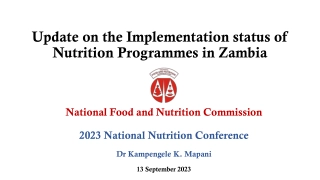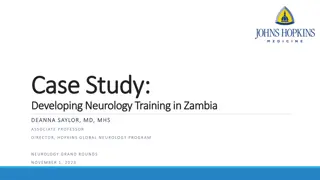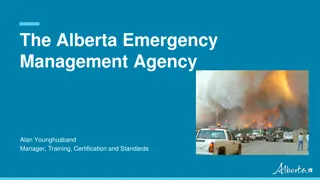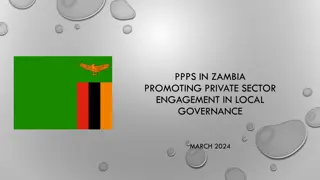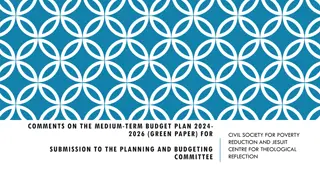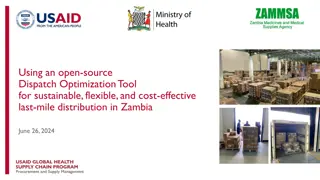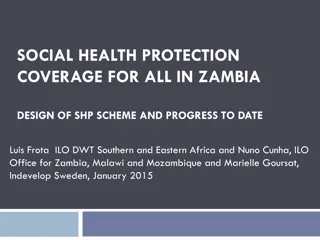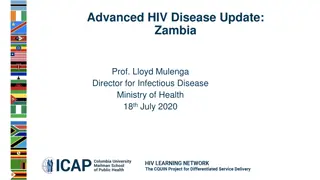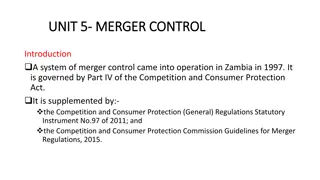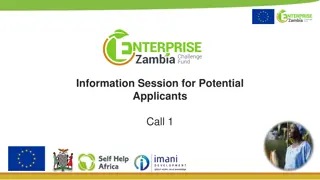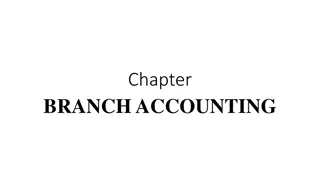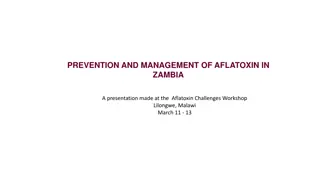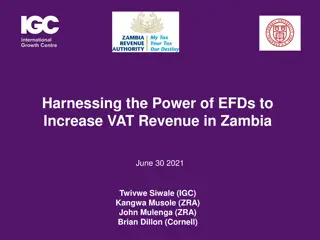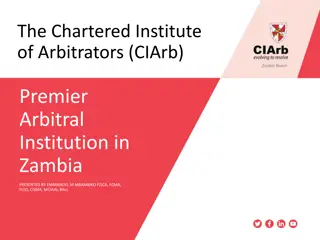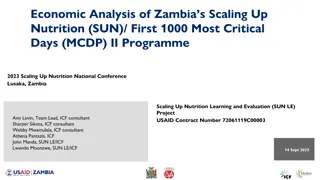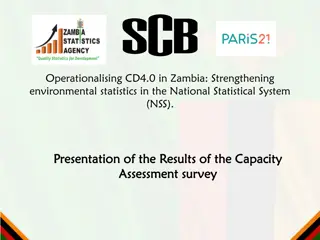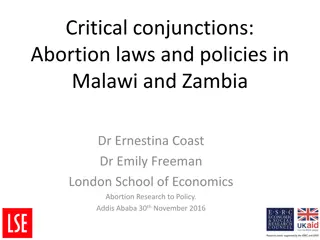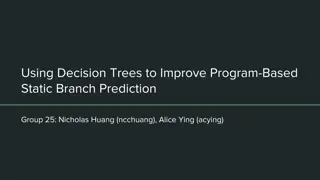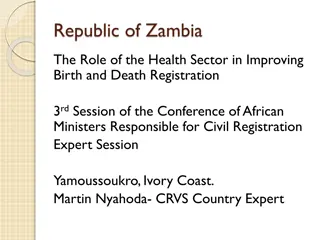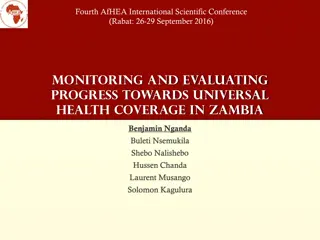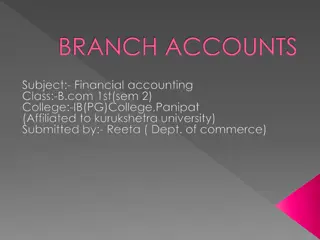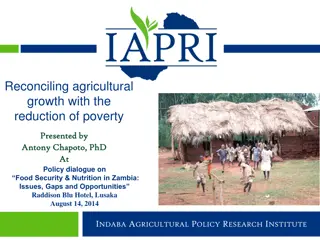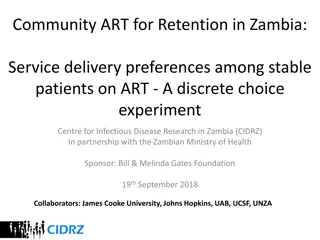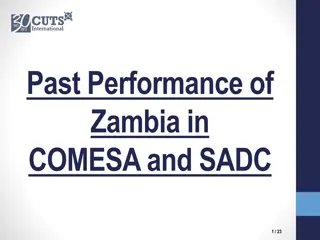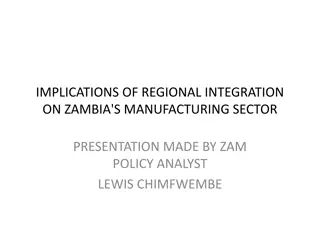Update on Nutrition Programmes Implementation in Zambia
Get the latest updates on the implementation status of nutrition programmes in Zambia at the 2023 National Nutrition Conference. Dr. Kampengele K. Mapani will discuss achievements, challenges, and the way forward.
2 views • 18 slides
Sustainable Food Systems and the Feed Zambia Zero Hunger Programme
The UN Food Systems Pathways and the Feed Zambia Zero Hunger Programme. It emphasizes the need for a transformative approach to food systems that benefits both people and the planet. The desired food system must ensure access to nutritious, sustainable, affordable, and desirable food for all. Throug
1 views • 10 slides
Enhancing Multisectoral Nutrition Coordination in Zambia
The Multisectoral Nutrition Information System (MNIS) presented at a LeNNS meeting in Lusaka highlights the importance of a multisectoral approach to address nutrition challenges in Zambia. The coordination structures, evidence, and recommendations emphasize the need for collaborative efforts, adequ
1 views • 37 slides
Challenges in Multisectoral Nutrition Information System in Zambia
The challenges faced by the National Food and Nutrition Commission of Zambia in utilizing the Multisectoral Nutrition Information System include limited funds for internet connectivity, high staff turnover, and low reporting rates. Recommendations to address these challenges include encouraging budg
0 views • 4 slides
Webinar #04: Utilities Driving Citywide Inclusive Sanitation in Zambia
Webinar #04 focuses on the role of commercial utilities in promoting citywide inclusive sanitation in Zambia. The event aims to facilitate knowledge exchange among water operators in Africa to enhance urban sanitation access. The agenda includes case studies from Luapula and Lukanga, guided discussi
0 views • 56 slides
NATSAVE Value Proposition to Local Authorities Presentation
NATSAVE, a 100% Government owned Financial Institution, outlines its brand journey and understanding of local authority needs in Zambia. With a vision of Financial Inclusion, NATSAVE offers solutions for efficient fund disbursement, project financing, and revenue collection. The bank's heritage date
0 views • 13 slides
Improving Neurology Training in Zambia: Challenges and Progress
Developing neurology training in Zambia faces obstacles such as limited neurologists, inadequate resources, and lack of specialized programs. The country's healthcare system, particularly at the University Teaching Hospital, is strained with neurology patients managed under internal medicine. Initia
1 views • 15 slides
Dr. Krishna Mujumdar's 54-Year Journey: A Visual Presentation
Embark on a visual journey through the past 54 years of Dr. Krishna Mujumdar's life, from celebrating Zambia's independence to his veterinary education and professional experiences in Africa. Explore his impactful work with cattle breeds and government services in Zambia, showcasing his dedication t
1 views • 41 slides
Alberta Emergency Management Agency Overview
The Alberta Emergency Management Agency (AEMA) is dedicated to providing strategic leadership in emergency management and business continuity in Alberta. AEMA collaborates with partners and stakeholders to enhance disaster resilience in the region. The agency's structure includes the Managing Direct
1 views • 19 slides
Promoting Private Sector Engagement in Local Governance through PPPs in Zambia
This presentation outlines the promotion of private sector engagement in local governance in Zambia through Public-Private Partnerships (PPPs). It covers the legal and institutional frameworks, processes, sub-national level PPP projects, current initiatives, lessons learned, and conclusions. The ove
2 views • 23 slides
ROCINANTES Projects in Africa: Transforming Communities Through Health and Education Initiatives
ROCINANTES, founded in 2006 in Japan, is making a significant impact in Sudan and Zambia through various projects including mobile medical clinics, school construction, water supply initiatives, and maternal and child health programs. The organization's efforts in Sudan particularly focus on areas s
3 views • 21 slides
Decentralisation Policy in Zambia: Enhancing Local Development Through Citizen Participation
The National Decentralisation Policy in Zambia, approved in 2002 and revised in 2016 and 2023, focuses on achieving sustainable development and improved service delivery through citizen engagement. Rooted in the belief that community involvement is crucial for socio-economic progress, the policy out
2 views • 12 slides
Zambia's Debt Restructuring Under G20 Common Framework
Zambia is undergoing debt restructuring to address its high debt burden, with efforts including moratorium on debt service payments, involvement in the G20 Common Framework, and significant maturity extensions on existing debt. The country aims to improve its debt carrying capacity and unlock resour
1 views • 11 slides
Analysis of Zambia's Medium-Term Budget Plan 2024-2026 for Poverty Reduction
Zambia's economy faces challenges due to factors like debt restructuring delays and reduced output in key sectors. The cost of living remains high, impacting citizens' well-being. Effective strategies and combating corruption are crucial for achieving Vision 2030 goals amid economic instability. Gov
1 views • 25 slides
Using Open-Source Optimization Tool for Last-Mile Distribution in Zambia
Explore the utilization of an open-source Dispatch Optimization Tool (DOT) for sustainable, flexible, and cost-effective last-mile distribution in Zambia. The tool aims to reduce costs, optimize delivery routes dynamically, and enhance efficiency in supply chain management. Learn about the benefits,
1 views • 18 slides
Designing a Social Health Protection Scheme for All in Zambia
In January 2015, Luis Frota, Nuno Cunha, and Marielle Goursat presented a plan for social health protection coverage in Zambia. The envisioned scheme includes mandatory enrollment, a single-payer payment system, comprehensive benefit packages, and close links to service providers. Progress has been
1 views • 8 slides
Multi-Sectoral Nutrition Information System (MNIS) Overview and Implementation Details
The Multi-Sectoral Nutrition Information System (MNIS) is a web-based platform used by the National Food and Nutrition Commission (NFNC) in Zambia to collect essential data for monitoring and decision-making in the nutrition sector. MNIS facilitates the gathering of functional information to support
1 views • 10 slides
Update on Advanced HIV Disease in Zambia: Prof. Lloyd Mulenga Shares Insights
Prof. Lloyd Mulenga, Director for Infectious Disease at the Ministry of Health in Zambia, provided an update on Advanced HIV Disease (AHD) in the country. The update includes progress towards the 95-95-95 target, prevalence of AHD, mortality rates among PLHIV, coordination of AHD services at the nat
2 views • 16 slides
Merger Control in Zambia: Regulations and Rationale
The system of merger control in Zambia, established in 1997 under the Competition and Consumer Protection Act, aims to regulate mergers to prevent market dominance and adverse effects on competition. Merger regulation objectives include safeguarding competition, preventing anti-competitive behavior,
0 views • 29 slides
Enterprise Zambia Challenge Fund - Supporting Sustainable Agriculture
Enterprise Zambia Challenge Fund, implemented by Self Help Africa with support from the European Union and the Government of Zambia, aims to integrate smallholder farmers into sustainable value chains in Zambia. The project provides economic, nutrition, and technical support to agri-enterprises, wit
0 views • 51 slides
Overview of Branch Accounting and its Importance in Business Operations
Branch accounting involves managing and tracking the financial activities of geographically separated branches within an enterprise. It helps in evaluating the profitability, financial position, and performance of each branch, determining the need for resources, and assessing the branch managers. Va
0 views • 20 slides
Addressing Aflatoxin Challenges in Zambia: Prevention and Management Strategies
Zambia faces significant challenges with aflatoxin contamination, impacting food safety and security. The population largely resides in urban areas, where issues of poverty, poor nutrition, and food insecurity prevail. Efforts in aflatoxin research and management are underway, including biocontrol i
0 views • 15 slides
Enhancing VAT Revenue in Zambia through Electronic Fiscal Devices
Analyzing the impact of Electronic Fiscal Devices (EFDs) on VAT remittances in Zambia and exploring policies to complement their implementation. The study discusses the design, distribution, and effects of EFDs, highlighting a reduction in remittances post-registration. The research also examines se
0 views • 16 slides
Understanding the Provincial Government Structure in Canada
Canada operates under a parliamentary democracy with three branches of government - Executive, Legislative, and Judicial. In Ontario, the Legislative Branch debates and passes laws, the Executive Branch implements laws, and the Judicial Branch interprets laws. The government is formed by the party w
0 views • 14 slides
Role and Function of Zambia's Parliament
Zambia's Parliament, consisting of the President and the National Assembly, plays a crucial role in the country's legislative process. The National Assembly is composed of directly elected members and nominations from the President, with specific rules regarding qualifications and functions. Parliam
0 views • 32 slides
The Chartered Institute of Arbitrators (CIArb) in Zambia: Premier Arbitral Institution
The Chartered Institute of Arbitrators (CIArb) is a global center of excellence for alternative dispute resolution (ADR) practices. Established in 1915 and incorporated in 1925 in the UK, it aims to elevate the status of arbitration. The Zambia branch, established in 2011, offers various services in
0 views • 18 slides
Branch Accounting Overview and Entries
Branch accounting involves recording transactions between the head office and branches, including goods sent, sales, debtors, and profits. Entries for credit sales, invoice pricing, and adjustments are crucial for accurate branch accounts. The process ensures proper tracking of branch activities and
1 views • 7 slides
Economic Analysis of Zambia's Scaling Up Nutrition (SUN) Programme
An economic analysis of Zambia's Scaling Up Nutrition (SUN) programme focusing on the First 1000 Most Critical Days (MCDP) II Programme in 2023. The analysis evaluates main drivers of stunting decline, impact assessment of interventions, and efficient resource allocation. It aims to provide insights
0 views • 39 slides
Strengthening Environmental Statistics in Zambia: Capacity Assessment Results
Presentation of the results from a survey conducted in Zambia to identify environmental statistics in the National Statistical System. The survey focused on key capacity areas applying the CD4.0 approach, including institutional setting, legal framework, funds, infrastructure, data coordination, sta
0 views • 27 slides
Comparison of Abortion Laws in Malawi and Zambia
Dr. Ernestina Coast and Dr. Emily Freeman from the London School of Economics conducted research on the critical conjunctions of abortion laws and policies in Malawi and Zambia. The current legal positions in both countries differ, with Malawi allowing a broader range of legal grounds for abortion c
0 views • 30 slides
Using Decision Trees for Program-Based Static Branch Prediction
This presentation discusses the use of decision trees to enhance program-based static branch prediction, focusing on improving the Ball and Larus heuristics. It covers the importance of static branch prediction, motivation behind the research, goals of the study, and background on Ball and Larus heu
0 views • 36 slides
Unlocking Zambia's Tourism Potential: A Comprehensive Analysis
Explore the untapped potential of Zambia's tourism industry through a detailed presentation covering its current status, importance, global comparison, reasons for poor performance, and future prospects. Discover how Zambia can overcome challenges and leverage its unique attractions to boost visitor
0 views • 12 slides
The Role of the Health Sector in Birth and Death Registration in Zambia
The health sector plays a crucial role in improving birth and death registration in Zambia, as a significant percentage of these events occur in health facilities. This provides an opportunity for immediate registration at the point of occurrence, contributing to better vital event recording. Despit
0 views • 10 slides
Monitoring and Evaluating Progress Towards Universal Health Coverage in Zambia
This paper presented at the Fourth AfHEA International Scientific Conference in Rabat discusses the importance of monitoring progress towards Universal Health Coverage (UHC) in Zambia. It assesses Zambia's ability to report on the WHO/World Bank UHC indicators, reviews the policy context, and evalua
0 views • 19 slides
Promoting Pro-competitive Reforms in Zambia
Addressing the current challenges in bus transportation and maize sector in Zambia, key findings suggest the need to enhance quality control for buses, reform fare setting processes, introduce route rationalization, and improve competition in the maize industry. By implementing policy and practice c
0 views • 14 slides
Understanding Branch Accounting in Financial Management
Branch accounting is a crucial system where separate accounts are maintained for each branch or operating location of an organization. Its objectives include ascertaining branch-wise profits or losses, exercising control, maintaining proper records, and coordinating operations. Explore types of bran
0 views • 15 slides
Reconciling Agricultural Growth with Poverty Reduction in Zambia
The presentation by Dr. Antony Chapoto at the Policy Dialogue on Food Security & Nutrition in Zambia highlighted the economic achievements, challenges, and opportunities for Zambia. Despite significant agricultural growth and GDP increase, persistent rural poverty remains a major concern, with 80% o
0 views • 34 slides
Service Delivery Preferences Among Stable HIV Patients in Zambia
A study conducted in Zambia explored the service delivery preferences of stable patients on antiretroviral therapy (ART) through a discrete choice experiment. The research focused on the benefits of differentiated service delivery, gaps in knowledge regarding patient preferences, and demographic cha
0 views • 9 slides
Past Performance of Zambia in COMESA and SADC
Zambia's trade involvement in COMESA and SADC regions, including its export and import partners, trade overview within COMESA, and the impact of regional integration on the country's economy. The content discusses the successes, challenges, and historical background of regional integration in Africa
0 views • 24 slides
Implications of Regional Integration on Zambia's Manufacturing Sector
Regional integration has a significant impact on Zambia's manufacturing sector, influencing trade patterns and partnerships with countries like South Africa, the DRC, and Zimbabwe. The presentation by policy analyst Lewis Chimfwembe delves into the background of regional economic communities, Zambia
0 views • 12 slides
